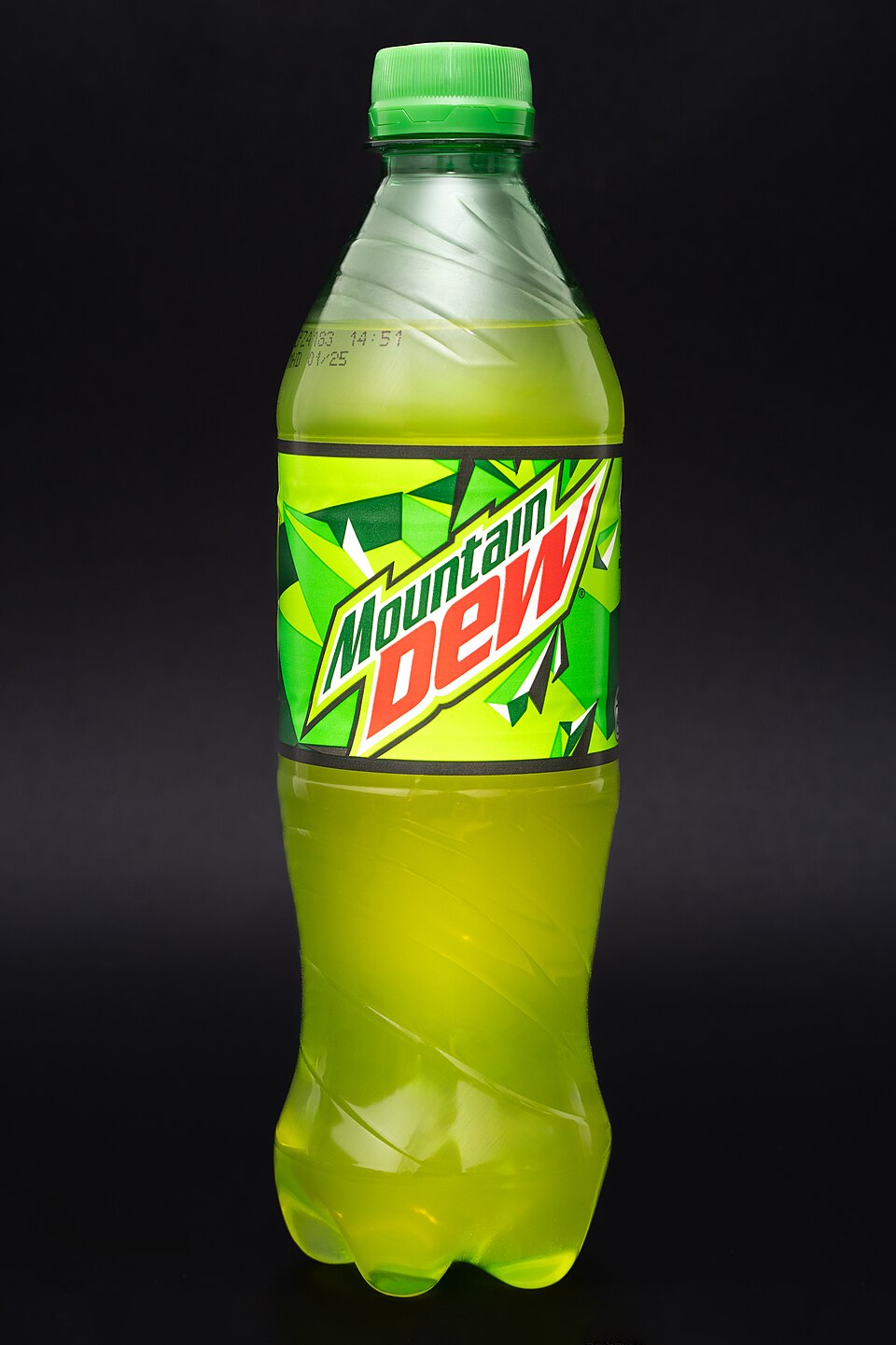Sodas are a staple in many American diets, offering a quick refreshment and a burst of sweetness. However, beneath the fizz and flavor lie ingredients that may pose significant health risks. From excessive sugars to controversial additives, certain sodas contain components linked to various health concerns. Understanding these harmful soda ingredients is crucial for making informed dietary choices. Let’s delve into ten popular sodas that are best consumed with caution—or avoided altogether.
1. Mountain Dew

Mountain Dew is notorious for its high sugar content and the inclusion of brominated vegetable oil (BVO), an additive banned in several countries due to health concerns. BVO has been associated with neurological issues and thyroid problems. A 12-ounce can of Mountain Dew contains approximately 46 grams of sugar, exceeding the daily recommended limit for added sugars. The combination of high sugar and BVO makes this beverage a less-than-healthy choice. Opting for alternatives without such additives can be a better option for your health.
2. Coca-Cola
Coca-Cola, while iconic, contains caramel color, which may include 4-methylimidazole (4-MEI), a compound linked to cancer in animal studies. Additionally, a 12-ounce can packs about 39 grams of sugar, contributing to obesity and type 2 diabetes risks. The acidity of Coca-Cola can also erode tooth enamel over time. Regular consumption may lead to various health issues, making moderation key. Considering healthier beverage options can help mitigate these risks.
3. Pepsi
Similar to Coca-Cola, Pepsi contains caramel color with potential 4-MEI content and high levels of sugar—approximately 41 grams per 12-ounce can. Excessive sugar intake is linked to numerous health problems, including heart disease and metabolic disorders. The acidity in Pepsi can also contribute to dental erosion. Being mindful of these factors is important when choosing your beverages. Exploring lower-sugar alternatives may benefit your overall health.
4. Fanta Orange
Fanta Orange is known for its vibrant color and sweet taste, but it contains artificial dyes like Yellow 6 and Red 40, which have been scrutinized for potential health effects. A 12-ounce can contains about 44 grams of sugar, significantly impacting daily sugar intake. The combination of artificial colors and high sugar content raises concerns about hyperactivity in children and other health issues. Limiting consumption of such artificially colored and sweetened beverages is advisable. Opting for naturally flavored drinks can be a healthier choice.
5. Dr Pepper
Dr Pepper’s unique blend of 23 flavors includes high fructose corn syrup and caramel color, both of which have been linked to health concerns. A 12-ounce can contains approximately 40 grams of sugar, contributing to the risk of obesity and diabetes. The presence of phosphoric acid can also lead to decreased bone density over time. Regular consumption may have cumulative negative effects on health. Considering beverages with fewer additives and lower sugar content can be beneficial.
6. Sprite
Sprite, though caffeine-free, contains high levels of sugar—about 38 grams per 12-ounce can—and citric acid, which can erode tooth enamel. The lack of caffeine doesn’t equate to a healthier option, as the sugar content still poses significant health risks. Regular intake can lead to weight gain and dental problems. Being aware of these factors is important when selecting beverages. Choosing drinks with natural sweeteners or lower sugar content can be a better alternative.
7. Sunkist Orange Soda
Sunkist Orange Soda contains both high sugar levels and artificial coloring agents like Yellow 6, which have been linked to behavioral issues in children. A 12-ounce can has approximately 44 grams of sugar, exceeding recommended daily limits. The combination of sugar and artificial additives raises concerns about long-term health effects. Moderation is key when consuming such beverages. Exploring natural fruit-flavored drinks without artificial dyes may be a healthier choice.
8. Barq’s Root Beer
Barq’s Root Beer contains caffeine, unlike many other root beers, and high levels of sugar—around 45 grams per 12-ounce can. The inclusion of caffeine can lead to increased heart rate and sleep disturbances, especially in sensitive individuals. High sugar content contributes to the risk of obesity and dental issues. Being mindful of these factors is important when choosing root beer options. Opting for caffeine-free and lower-sugar alternatives can be a healthier decision.
9. Crush Grape Soda
Crush Grape Soda is known for its intense sweetness and vibrant color, achieved through artificial dyes like Red 40 and Blue 1. A 12-ounce can contains about 43 grams of sugar, significantly impacting daily sugar intake. The artificial colors used have been associated with allergic reactions and behavioral issues in some individuals. Limiting consumption of such brightly colored, sugary beverages is advisable. Choosing naturally flavored and colored drinks can be a better option for health-conscious consumers.
10. Diet Coke
Diet Coke, while sugar-free, contains artificial sweeteners like aspartame, which have been the subject of health debates. Some studies suggest potential links between aspartame and health issues, though conclusive evidence is lacking. Additionally, the acidity in Diet Coke can contribute to tooth enamel erosion. While it may be a lower-calorie option, it’s not without its concerns. Considering beverages with natural sweeteners or water infused with fruits can be healthier alternatives.
Alternatives to Your Favorite Drinks
If you’re craving bubbles but want to avoid the typical soda pitfalls, here are a few brands making drinks with cleaner ingredients:
- Poppi – A line of “prebiotic soda” with modest sugar (often ≤ 5 g per can) and fruit juice bases. Many fans view it as a middle ground between water and full-sugar soda.
- Zevia – Sweetened with stevia (rather than sugar or artificial sweeteners), zero calories, and free of synthetic additives.
- Culture Pop – Often listed among “healthier soda alternatives” by reviewers.
- Sparkling / flavored seltzer waters – Brands that do simple carbonated water with natural flavor (no sugar or artificial sweeteners) are a safe default “swap-in.”
- Olipop – A soda-adjacent beverage that emphasizes prebiotics and botanical ingredients; it markets itself as a healthier alternative.
While none of these are perfect “health drinks,” they tend to avoid the worst offenders (heavy added sugar, controversial dyes, BVO, or excess artificial sweeteners) and are better options in moderation.
DIY & Natural Alternatives You Can Make at Home
For readers who want full control over ingredients, here are some homemade or simple swaps:
- Sparkling fruit water or “spa water”: Add slices of citrus (lemon, lime, orange), cucumber, mint, ginger, or berries to plain or lightly carbonated water. The flavor boost is refreshing with zero need for additives.
-
Tea-based fizzy drinks: Brew green, black, or herbal tea, chill it, and combine with club soda or seltzer. You’ll get flavor, antioxidants, and fewer of the downsides of soda. (Skip adding too much sweetener.)
WebMD’s guide to soda alternatives recommends tea as a healthier flavored substitute. - Juice spritzers: Dilute 100 % fruit juice with sparkling water, using a 1:2 or 1:3 ratio. You still get real fruit flavor (and vitamins) without the sugar overload in full juice or soda forms.
- Kombucha or fermented fizzy drinks: These are slightly tangy, naturally carbonated, and often have some probiotics. (Be mindful of sugar content — some versions add sugar post-fermentation.)
- Infused water with vinegars or botanicals: Some people like using small amounts of apple cider vinegar (diluted) or botanical extracts (like hibiscus, ginger, rosemary) in sparkling water to get an interesting tang without the junk. Use carefully — too much acidity can stress tooth enamel.
Making Informed Choices for Better Health
Understanding the harmful soda ingredients present in popular beverages empowers consumers to make healthier choices. While occasional indulgence may not pose significant risks, regular consumption of these sodas can lead to various health issues. Opting for drinks with fewer additives, lower sugar content, and natural ingredients can contribute to overall well-being. Staying informed and reading labels are crucial steps in making better dietary decisions.
Have you reconsidered your soda choices after learning about these harmful ingredients? Share your thoughts and any healthier alternatives you’ve discovered in the comments below!
What to Read Next
- The Dangerous Ingredient That Gives Soda Its Brown Color
- 7 “Healthy” Store-Brand Items That Have More Sugar Than a Can of Soda
- 10 of the Worst Sodas in America Due to Harmful Ingredients
- Should SNAP Benefits Cover Soda and Junk Food? Here’s What People Think
- Have You Quit Soda: Here are 7 Great Alternatives
The post 10 of the Worst Sodas in America Due to Harmful Ingredients appeared first on Grocery Coupon Guide.







